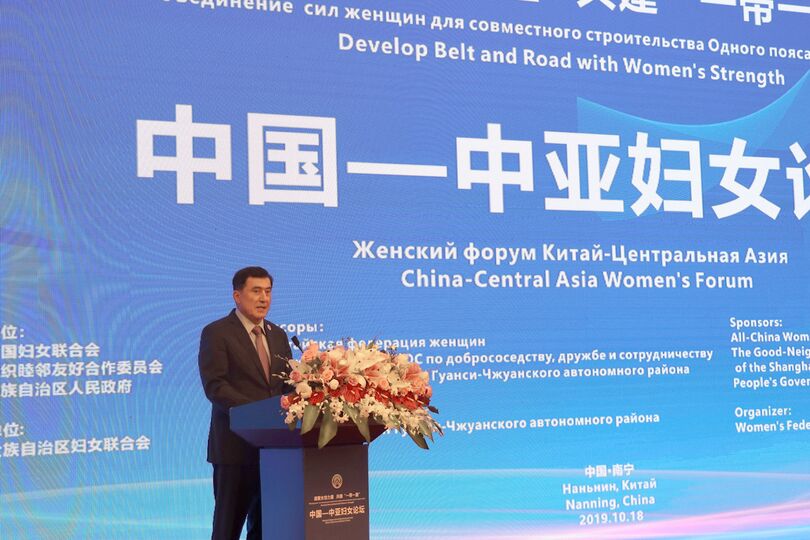On 18 October 2019, Nanning, Guangxi-Zhuang Autonomous Region, PRC, hosted a Women's Forum held as part of the 7th China-Central Asia Cooperation Forum.
Ms Shen Yueyue, Vice Chairperson of the Standing Committee of the National People's Congress and President of the All-China Women's Federation and China's SCO Committee on Good-Neighbourliness, Friendship and Cooperation, said in her opening remarks at the Forum that the traditional friendship between China and the Central Asian and South Caucasian countries went a long way back and was closely linked with the Silk Road.
President Xi Jinping's Road and Belt Initiative gave a fresh impetus to interaction and opened up new opportunities for our countries. Joint work between our countries is based on the Shanghai Spirit principles and is characterised by political trust, mutual respect, equality, and mutually beneficial cooperation. Today, we have created a new platform for dialogue and effective use of the potential for cooperation between women's organisations in an effort to promote BRI," she said.
In addition to this, she provided detailed information on China's achievements in strengthening women's role in society and protecting their rights and interests over the last 70 years.
In his welcoming remarks, SCO Secretary-General Vladimir Norov said that the Shanghai Cooperation Organisation was a dynamically developing region with a territory exceeding 60 percent of Eurasia and with a population of over 3.2 billion, more than a half of which were females.
Women's equality and full-fledged involvement in dealing with political and socioeconomic problems is a prerequisite of SCO countries' sustainable development.
He stressed the SCO's commitment to the UN Sustainable Development Goals, effective gender equality, and women's wider rights and empowerment. The goals of the SCO Development Strategy 2025 and the UN Sustainable Development Goals 2030 go hand in hand in terms of their attitude to gender equality and access to the entire spectrum of services and main components of human activities.
Norov said that the SCO had worked hard in recent years to promote "women's" cooperation. There were SCO Women's Forums held in Beijing in May 2018 and in Bishkek in May 2019.
He also noted that it was important to institutionalise the Forum and create a specific mechanism for cooperation between women's associations within the SCO and for contacts with related UN divisions.
Speaking about the role of women in the field of IT development, he stressed that the world was in thrall to a stereotype that industry, technologies and STEM research were not for women, "but in reality, there are enough examples of women performing well in these complicated fields. A case in point is China's Lu Youtong, who heads the National Supercomputer Centre in Guangzhou. Other SCO countries also have worthy representatives of the fairer sex, who show that they are successful in many important and new spheres."
It was also stated that Chinese women made a huge contribution to modern China's development. Over these years, the Federation helped to enhance their role in society, strengthen the foundations of female development, create the necessary legal infrastructure and achieve equality between the sexes. The Federation has emerged as a truly mass-based women's public organisation representing all of China's ethnic groups and social strata.
"Modern Chinese women take an active part not only in building the Chinese brand of socialism, creating the Community of Common Destiny, and implementing the Road and Belt project but also in maintaining global peace and stability by being involved in peacekeeping operations. Women account for 55 percent of those doing online business in China. The ‘internet + female employment' model has emerged, which helps women to access efficient employment services while staying at home. In this sense, China's experience in implementing women's rights would be useful to many countries, including SCO member-states," Vladimir Norov stressed.
The Forum was attended by representatives of the Republic of Kazakhstan, the Kyrgyz Republic, the Republic of Tajikistan, the Republic of Uzbekistan, the Republic of Armenia, the Republic of Azerbaijan, as well as representatives of the All-China Women's Federation and its regional branches.
The All-China Women's Federation is a mass-based public organisation representing all of China's ethnic groups and social strata. The ACWF was established in 1949 to unite and mobilise Chinese women for involvement in China's socioeconomic construction efforts, protection of women's interests, promotion of gender equality and so on.
